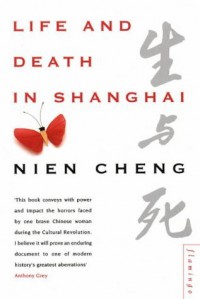Currently reading
A Feast for Crows
Japan at War: An Oral History
Armageddon: A Novel of Berlin
Falling Free (Vorkosigan Saga, #4)
Century Rain
The Bounty: The True Story of the Mutiny on the Bounty
Rite of Passage
Over the Edge of the World: Magellan's Terrifying Circumnavigation of the Globe
The 900 Days: The Siege of Leningrad
The Forsaken: From The Great Depression To The Gulags: Hope And Betrayal In Stalin's Russia
 How many pages are absolutely necessary to tell a gripping, frightening story? 50? 200? 400? 1200, in case your editor died? Editors are extinct anyways.
How many pages are absolutely necessary to tell a gripping, frightening story? 50? 200? 400? 1200, in case your editor died? Editors are extinct anyways. My favorite is the shortest science fiction story written by [a:Fredric Brown|51503|Fredric Brown|http://d.gr-assets.com/authors/1234483488p2/51503.jpg] called “The Knock”, only two sentences long and as it happens; has fewer words than this paragraph. Here it is, in its entirety:
“The last man on earth sat alone in a room. There was a knock on the door….”
17 words. And yet it implies toward innumerable possibilities, each and every one of them terrifying. The deeper you think, the chillier it gets.
Of course, Fredric Brown explained his story.
[b:The Death of Grass|941731|The Death of Grass|John Christopher|http://d.gr-assets.com/books/1309962069s/941731.jpg|797220], even though just about 200 pages long, packs a real punch which it delivers right to the reader's gut. This is not one of your cozy catastrophes but is in fact the darkest, grimiest post-apocalyptic fiction you will ever come across. It’s really sad that this book is not mentioned in the same vein as other grim PA books of the era and is generally ignored and forgotten.
Human empathy flourishes only as long as the civilization prevails. Once the norms are changed, only one thing matters – survival. At all costs. The book is unapologetic, brutal and devoid of any conscience. One thing you might have noticed in most PA fiction is that that despite facing myriad of odds, the protagonists remain self-conscious. Not in this case.
And that’s what makes this book different and in some ways, better than other post-apocalyptic novels.
Read this work, ye mighty, and despair!
 Terrible terrible book. A couple on their holiday retreat gets caught in an avalanche while skiing which they survive. When they return to their hotel, it’s deserted. The whole village is empty. They are alone. After some failed attempts to contact the outside world and some tries to get out by a car themselves, they decide that there is nothing else to do, so they ski, then they eat and have sex then ski again then ski some more and have more sex then ski ski ski ski... I have now decided that I hate skiing and I hate reading about skiing even more.
Terrible terrible book. A couple on their holiday retreat gets caught in an avalanche while skiing which they survive. When they return to their hotel, it’s deserted. The whole village is empty. They are alone. After some failed attempts to contact the outside world and some tries to get out by a car themselves, they decide that there is nothing else to do, so they ski, then they eat and have sex then ski again then ski some more and have more sex then ski ski ski ski... I have now decided that I hate skiing and I hate reading about skiing even more.When you read this sort of book, you know that there is always something more to the story than meets the eye. You just hope that it would not be a clichéd something. Less than halfway through, I, my dog and even my dog’s dog knew where this story was headed but we all hoped that it would not go there. It did. The ending was mother of all clichés.
I, my dog and my dog’s dog don’t recommend this book.
ski ski ski ski ski ski... whee… wheeee…
 Reza Kahlili (not his real name) of the Revolutionary Guards became a spy for the CIA when Iran came under the thumb of Ayatollah Khomeini. This is his story.
Reza Kahlili (not his real name) of the Revolutionary Guards became a spy for the CIA when Iran came under the thumb of Ayatollah Khomeini. This is his story.I read this book primarily because I wanted to know more about the events that occurred before and under Ayatollah Khomeini. As far as that was concerned, the book didn't disappoint.
Kahlili writes very clearly about the events that eventually toppled the Shah and thus made Khomeini the unchallenged leader of Iran. And while people were not totally happy under the Shah, they were at least content as they had some little liberties in their private lives which they cherished. Ayatollah Khomeini changed all that. As USSR became a totalitarian state under the guise of Communism, Iran became a police state under the pretense of religious fanaticism. Iran's rulers interpreted their religion as per their convenience.
After his childhood friend was tortured and shot by the fanatical regime, Kahlili became disillusioned by the Iran government’s promise to build a proper state for its citizens. As a result, he became a CIA spy operating in Iran. I think he took this step more out of obligation to his dead friend, although he states in his book that by being a spy he wanted to let the US know what was happening in Iran which would eventually convince the USA to pressurize the Khomeini regime to mend its ways which would bring peace to his country. If he truly believed that, he was being naïve. And he actually admits that himself in the concluding chapters of the book. International politics has never worked that way. Never has, never will.
His spying didn’t improve the conditions in Iran which he hoped might happen due to the intervention of outside world (Nobody intervened, as anybody might have guessed right from the start even without the benefit of hindsight), but at least Kahlili could have the personal satisfaction that he hurt the repressive regime in some indirect ways which took away his friend and everybody else’s personal freedom in Iran.
 Ever since I read [b:World War Z: An Oral History of the Zombie War|8908|World War Z An Oral History of the Zombie War|Max Brooks|http://d.gr-assets.com/books/1320398267s/8908.jpg|817], reading PA zombie fiction has become one of my guilty pleasures. Whenever I feel like I am having a "reader's block", I pick up a zombie book to get out of it, and so far it has worked!
Ever since I read [b:World War Z: An Oral History of the Zombie War|8908|World War Z An Oral History of the Zombie War|Max Brooks|http://d.gr-assets.com/books/1320398267s/8908.jpg|817], reading PA zombie fiction has become one of my guilty pleasures. Whenever I feel like I am having a "reader's block", I pick up a zombie book to get out of it, and so far it has worked!A couple of days back, I decided to venture into the zombie infested wastelands again as I was not in the mood to continue with my other books. And as soon as I knew that [a:Manel Loureiro|1641503|Manel Loureiro|http://d.gr-assets.com/authors/1306626613p2/1641503.jpg] has written a zombie book which was set in a different country, Spain, rather than US or UK as most of the zombie books are, I decided to have a go at it. And thankfully enough, the protagonist was not ex-army or of a similar background, but a lawyer (The author himself is a lawyer in real life, so basically he wrote himself as the protagonist; standard zombie fiction fare). But for a change, it was refreshing to read about someone who didn't have the professional skills to kill the hordes of undead with powerful weapons and deadly moves but instead survived by keeping his wits about him. Curiously enough, [a:Manel Loureiro|1641503|Manel Loureiro|http://d.gr-assets.com/authors/1306626613p2/1641503.jpg] hasn't use the word "Zombie" even once to describe the undead.
There were some doubtful speculations done by the author regarding the less developed countries faring better in a zombie apocalypse compared to the western world, but what the hell, we are talking about zombies here. Leave your brain out of your room (preferably where nobody could eat it) before you read these kind of books.
 [b:The Sparrow|334176|The Sparrow (The Sparrow, #1)|Mary Doria Russell|https://d202m5krfqbpi5.cloudfront.net/books/1230829367s/334176.jpg|3349153] is a first-contact novel by [a:Mary Doria Russell|4007|Mary Doria Russell|https://d202m5krfqbpi5.cloudfront.net/authors/1236919634p2/4007.jpg] where humans in 2019 A.D. go on an interstellar mission from Earth to make "first-contact" with an alien species on a planet which, later they would come to know as Rakhat. The plot follows two timelines – one, of the scientific mission itself and the other, in the year 2060 A.D., where the sole survivor of the mission, Emilio Sandoz, Jesuit priest and linguist, returns alone to Earth and recounts his horrific experience.
[b:The Sparrow|334176|The Sparrow (The Sparrow, #1)|Mary Doria Russell|https://d202m5krfqbpi5.cloudfront.net/books/1230829367s/334176.jpg|3349153] is a first-contact novel by [a:Mary Doria Russell|4007|Mary Doria Russell|https://d202m5krfqbpi5.cloudfront.net/authors/1236919634p2/4007.jpg] where humans in 2019 A.D. go on an interstellar mission from Earth to make "first-contact" with an alien species on a planet which, later they would come to know as Rakhat. The plot follows two timelines – one, of the scientific mission itself and the other, in the year 2060 A.D., where the sole survivor of the mission, Emilio Sandoz, Jesuit priest and linguist, returns alone to Earth and recounts his horrific experience. The book was good, but I didn’t feel that it was as good as some reviews here on Goodreads led me to believe.
Let me tell you why.
But first, the good:
Interesting Throughout (Although it has its drawbacks)
Even though the pace wanes gradually, especially in the sections where Emilio Sandoz recounts the events of his visit to the alien world, the book kept me going as it has a very accessible prose. It is written beautifully and I think that’s the strongest point of “The Sparrow”.
Well Fleshed-out Characters
All the characters, except Mark Robichaux, are really well drawn. I cared about what happened to them. One little problem I had with some of the characters was that that they seemed too sweet sometimes. Especially Anne.
Linguistics
The main reason why I read this book in the first place was that this story dabbles in linguistics and anthropological studies. Emilio Sandoz spends some time studying the alien culture and learning their language. For me, those were the best parts of the book.
Now, the bad, which sadly overshadows all the good.
**Minor Spoilers Below**
“Science” in the Science Fiction is unsatisfactory
The book is billed as science fiction, but after reading this as a science fiction enthusiast, I have to admit that the SF aspect of the book didn’t impress me much.
Here, the aliens feel more like humans than the aliens that they are supposed to be. There were only some perfunctory remarks about their physical dissimilarities from humans but apart from that, they felt more like humans to me than an entirely different species on an alien planet. But that might be because Mary Doria Russell didn’t really wanted her readers to feel that the book was set on an entirely different planet. She wanted us to feel that the book was set on earth itself. This is what she said at the end of her book:
Q: Until “The Sparrow” you had only written serious scientific articles and technical manuals. How did you end up writing a speculative novel?
A: The idea came to me in the summer of 1992 as we were celebrating the 500th anniversary of Columbus’s arrival in the New World. There was a great deal of historical revisionism going on as we examined the mistakes made by Europeans when they first encountered foreign cultures in the Americas and elsewhere. It seemed unfair to me for people living at the end of the twentieth century to hold those explorers and missionaries to standards of sophistication and tolerance that we hardly manage even today. I wanted to show how very difficult first contact would be, even with the benefit of hindsight. That’s when I decided to write a story that put modern, sophisticated, resourceful, well-educated, and well-meaning people in the same position as those early explorers and missionaries—a position of radical ignorance. Unfortunately, there’s no place on Earth today where "first contact" is possible—you can find MTV, CNN, and McDonald’s everywhere you go. The only way to create a "first contact" story like this was to go off-planet.
But the fact remains that as far as world-building was concerned, this book failed. It was as if the characters were acting in front of a green-screen background on which the CGI was to be added later but Russell forgot to add the CGI scenes onto the screens after the final editing. So although the characters were likable, there was nothing else to talk about.
One other major problem I had with the SF aspect of this book was that that the characters decided to grow plants brought from Earth on Rakhat in totally unconfined conditions. Surely, as scientists they should have been aware of the ecological disasters that could occur if someone tries to introduce a new (here, a totally alien) species of flora in a different environment. Australia with its problem of Cane toad and European rabbits is the prime example of that. There are even some invasive plant species that are wrecking havoc in Australia and other places of the world. Robichaux did gave an excuse that the plants would die within a year if they were not taken care of, but that’s just irresponsible behavior on his part. That observation was based on studies performed on Earth. How could he really tell what would happen to the plants in an altogether alien environment?
But what really annoyed me the most were the decisions that almost all of the characters made while they were on Rakhat.
Poor Decisions Made By The Characters
Walking Out Without Spacesuit
As soon as they landed on Rakhat, the characters walked out without taking any basic precautions. It would have been more believable if they would have walked out first in some sort of protective suits and then gradually would have shed them after checking the air from land, as they did from space.
Lander Fuel Problem
Okay, so we spend most of the book learning about Sofia Mendes’s exceptional intelligence. But then she throws it all away when her Ultra Light crashes and she and Mark use the Lander to reach the colony without checking the fuel. Due to that, they were stranded for the rest of their lives on Rakhat (assuming if nobody from Earth came to their rescue) as there was not enough fuel left in the Lander to reach their ship in outer space. I am sure those rigorous training sessions that they went through before departing on their voyage covered the topics such as “How to check your fuel gauge” or "Know your Pre-flight checklist - 101" or something like “Use Your Goddamn Hyper-intelligence Before You Act".
They Lived With The Species Most Of The Time Who Were Not The Ones They Came To Meet
Now, singing drew the humans to Rakhat. But they stayed there most of the time with another species which had nothing to do with the singing that was heard on Earth by Arecibo. This made sure that as a reader, even after reading the whole book, we won’t know much about the alien culture that really triggered the mission in the first place.
Look, I am not discouraging anyone from reading this book. But as a science fiction fan, I felt disappointed. But if I assume that this was an historical fiction novel, it works on several levels. At least, it made me curious to know what happens to Emilio Sandoz in the next book. So I would definitely read the second book, if only to finish what I started, but I also have a lingering hope that maybe, just maybe, the poor decisions made by the first book's characters would produce some unforeseen repercussions for the characters of the second one when they reach Rakhat.
If that happens, I would consider it a satisfactory conclusion to a sweetly written, hauntingly memorable; but otherwise a scientifically flawed and sometimes, an annoying story.
 A funny little romp through the sex lives of Iranian women by the author of a more serious work, [b:Persepolis|991197|Persepolis|Marjane Satrapi|http://d.gr-assets.com/books/1327876995s/991197.jpg|13344769]. [b:Embroideries|9526|Embroideries|Marjane Satrapi|http://d.gr-assets.com/books/1320500258s/9526.jpg|1343320] is a very quick and light read which could be read in about 30 minutes. So, if you happen to be in a bookstore next time, you can read through it without even paying for it!
A funny little romp through the sex lives of Iranian women by the author of a more serious work, [b:Persepolis|991197|Persepolis|Marjane Satrapi|http://d.gr-assets.com/books/1327876995s/991197.jpg|13344769]. [b:Embroideries|9526|Embroideries|Marjane Satrapi|http://d.gr-assets.com/books/1320500258s/9526.jpg|1343320] is a very quick and light read which could be read in about 30 minutes. So, if you happen to be in a bookstore next time, you can read through it without even paying for it!But make sure you buy and treasure [b:Persepolis|991197|Persepolis|Marjane Satrapi|http://d.gr-assets.com/books/1327876995s/991197.jpg|13344769] if you haven't already read [a:Marjane Satrapi|6238|Marjane Satrapi|http://d.gr-assets.com/authors/1303646506p2/6238.jpg]'s more serious works.
 If you happen to be a Trekkie, I don’t have to tell you what a “Redshirt” is. If you are not, then just know that that the term “Redshirts” was coined from the science fiction television series Star Trek in which the extras (who wore a red uniform) got killed on a regular basis while the main characters like Kirk and Spock survived each ordeal. It was no conspiracy; it's just how the fictional universe has worked since the time immemorial. Main guys survive while the faceless extras are sacrificed to raise the stakes.
If you happen to be a Trekkie, I don’t have to tell you what a “Redshirt” is. If you are not, then just know that that the term “Redshirts” was coined from the science fiction television series Star Trek in which the extras (who wore a red uniform) got killed on a regular basis while the main characters like Kirk and Spock survived each ordeal. It was no conspiracy; it's just how the fictional universe has worked since the time immemorial. Main guys survive while the faceless extras are sacrificed to raise the stakes. [a:John Scalzi|4763|John Scalzi|http://d.gr-assets.com/authors/1236228326p2/4763.jpg] has used that particular pop culture trivia to write this novel. The thing with John Scalzi is, regardless of the subject matter, his books are always fun to read. Most of the time, we need to be in a right frame of mind to read certain books. But not with John Scalzi. You can pick up any of his books anytime with the assurance that it won't disappoint. But somehow it is not the case with most of the modern science fiction authors today. They have sucked the joy right out of the science fiction universe. Their characters have no sense of humor whatsoever. Seriously, what’s with the other modern science fiction authors who unfailingly churn out drier than a sand pit kind of characters in every book they write? Don’t they read this guy?
Scalzi intentionally renders his characters with a weird and often coarse sense of humor, even if the subject matter is a serious one. And I like his books exactly for that very reason. He is a genuinely funny guy. Just go over to his personal blog and you will see what I mean.
True, I didn't like this book as much as I liked [b:Old Man's War|51964|Old Man's War|John Scalzi|http://d.gr-assets.com/books/1346671475s/51964.jpg|50700] and [b:Fuzzy Nation|9647532|Fuzzy Nation|John Scalzi|http://d.gr-assets.com/books/1316132345s/9647532.jpg|18280046]. World-building sucked a bit and it was not as funny as his other works are. But having said that, it’s really unfair to compare this book especially with [b:Old Man's War|51964|Old Man's War|John Scalzi|http://d.gr-assets.com/books/1346671475s/51964.jpg|50700] as it is the kind of book that is very hard to top. Not just for John Scalzi, but for any other science fiction authors out there.
So if you haven’t read any books by John Scalzi yet, I suggest you start with “Old Man’s War” and take it from there. And if you already happen to be a fan of his works as I am, by all means get yourself a copy of “Redshirts” and be prepared to get lost in his science fiction world, again.
 Simply put, “Wild Swans” is a poor man’s [b:Life and Death in Shanghai|537404|Life and Death in Shanghai|Nien Cheng|http://d.gr-assets.com/books/1348908435s/537404.jpg|619099].
Simply put, “Wild Swans” is a poor man’s [b:Life and Death in Shanghai|537404|Life and Death in Shanghai|Nien Cheng|http://d.gr-assets.com/books/1348908435s/537404.jpg|619099]. Reason being that that while the initial chapters about [a:Jung Chang|1237|Jung Chang|http://d.gr-assets.com/authors/1281963145p2/1237.jpg]’s grandmother are informative and interesting as it gives us a peek into the life of people in Pre-Communist China; as the book progresses, Chang’s ignorance (as she was a little girl at that time) about the events happening around her becomes a permanent annoyance.
I am not saying that Chang was still ignorant about what happened in China during the “Great Leap Forward” and “The Cultural Revolution” after she grew up; she definitely knows her history, but it seems that she has tried her level best to hide that in her book.
She would write something like, "My dad was very sad about the things that were happening in China but for me it was very difficult to understand it at that time.” And then she would start talking about something else without even clarifying her point. Even with the benefit of hindsight, it seems that she never really wanted to write in detail about the causes, reactions and outcomes of the events like “The Cultural Revolution”.
Her book is what the title itself suggests, about three daughters of China, but it is only and only about the three daughters of China and I was expecting it to be a little more than that. Chang took her time to tell her story, 700 odd pages in all, so it’s only fair to expect her to write more about China’s history, but instead she chose to write about the flowers in the garden of the hospital where her father was being treated during the “Cultural Revolution”.
Even Mme Mao and her “Gang of Four”, the main perpetrators of “The Cultural Revolution”, gets only a passing mention.
As a biography, Wild Swans is a good book. But if you want to read a detailed history of “The Cultural Revolution” and of China at that time, read [b:Life and Death in Shanghai|537404|Life and Death in Shanghai|Nien Cheng|http://d.gr-assets.com/books/1348908435s/537404.jpg|619099] by [a:Nien Cheng|95739|Nien Cheng|http://d.gr-assets.com/authors/1338231155p2/95739.jpg] instead of this book. In my opinion, “Life and Death in Shanghai” is the best book written on “The Cultural Revolution” and also one of the best autobiographies ever written.
If you are going to read both the books (which I did), I suggest you start with “Wild Swans” first (which I didn’t), because if you read “Life and Death in Shanghai” before reading this book, chances are that you might end up appreciating “Wild Swans” much less than what you might have been predicting at the start.
 My second novella this year after Connie Willis's [b:Fire Watch|10301442|Fire Watch (Oxford Time Travel, #0.5)|Connie Willis|http://d.gr-assets.com/books/1347988641s/10301442.jpg|16295500] (which was just above average kind of a read).
My second novella this year after Connie Willis's [b:Fire Watch|10301442|Fire Watch (Oxford Time Travel, #0.5)|Connie Willis|http://d.gr-assets.com/books/1347988641s/10301442.jpg|16295500] (which was just above average kind of a read).This novella served as an introduction to Charles Stross's works to me and I think it was not a bad place to start. The amount of detail Stross crammed into this less than 100 pages novella was really amazing. With characters like Yuri Gagarin and Carl Sagan, Stross successfully managed to held my attention throughout. And the illustrations were funny too.
The staggering dimensions of the flat-earth and intelligent alien insects in this alternative historical setting made me wish that this was a full length novel rather than just a novella.
 Some acts are unjustifiable no matter how hard the perpetrators try to rationalize them. Bombing of Hiroshima and Nagasaki are undeniably among those. I firmly believe that the War Crimes Trials after World War-II should have been conducted even on some men of the Allied powers.
Some acts are unjustifiable no matter how hard the perpetrators try to rationalize them. Bombing of Hiroshima and Nagasaki are undeniably among those. I firmly believe that the War Crimes Trials after World War-II should have been conducted even on some men of the Allied powers. If it’s any consolation (although it’s not), the horrible aftereffects and the monstrous destructive power of nuclear weapons that the whole world came to realize after Hiroshima and Nagasaki might have kept a leash on the two world powers – USA and USSR – from using it during the Cold War on each other. Whatever other puny reasons the wartime experts might have had at that time for using the atomic bombs on Japan, one major fact remains to be pondered upon more deeply for the sake of our consciousness on being humans that the Japanese were used as lab rats to test the new weapons of mass destruction.
 Welcome to Mrs. Ivanova's Charm School, a top secret "facility" where they teach Russian spies to pass themselves off as Americans to even a real American. Then off to the US of A with a fake identity (Non-Russian, of course) where they would live as American citizens and would pass on the state secrets to their homeland and gradually, would get a virtual hold on the entire country. Who would teach them? The MIAs (missing in action) from the Vietnam War who were captured and flown illegitimately to the USSR from Vietnam.
Welcome to Mrs. Ivanova's Charm School, a top secret "facility" where they teach Russian spies to pass themselves off as Americans to even a real American. Then off to the US of A with a fake identity (Non-Russian, of course) where they would live as American citizens and would pass on the state secrets to their homeland and gradually, would get a virtual hold on the entire country. Who would teach them? The MIAs (missing in action) from the Vietnam War who were captured and flown illegitimately to the USSR from Vietnam.*********************************************************
I read this book purely because of the subject matter it dealt with. Have you ever wondered what happens to a soldier when he is considered MIA in any war? If luck is on his side, then he is probably dead. But if it is not, it's more than likely that the enemy has him and they are not going to acknowledge his existence. Ever. And sadly, there is little one can do about that as there is bound to be a severe lack of evidence to raise any legitimate inquiry.
But more often than not, it's incompetency and cavalier attitude on the part of that country's politicians that these men are doomed to live as prisoners for life. After all, they have served their purpose of fighting a war for their country, but now it's time for the peace talks and improving relations, so such minor and inconsequential hurdles should be ignored for the "greater" good.
Look on the web and you will not find a single country which has fought a war that is not being accused of wrongfully imprisoning MIAs of its enemies and denying their existence. Think of the devastation it may wrought on the psyche of the family members of that MIA who are never going to know for sure whether their beloved one is dead or alive.
So regardless of your nationality, try to spare a moment and think about these poor souls, because if your country has fought a war in the past 35-50 years, chances are that some of your countrymen who were listed as MIA at that time are still alive and being tortured daily for their patriotism.
*********************************************************
Now about [b:The Charm School|353814|The Charm School|Nelson DeMille|http://d.gr-assets.com/books/1337601423s/353814.jpg|1832566]. "The Charm School" felt 200 pages too long. Normal dialogues between characters seemed rather clunky to me. Especially intimate conversation between the main characters Sam Hollis and Lisa Rhodes felt really gawky most of the times. But I liked the dry witticism that [a:Nelson DeMille|1238|Nelson DeMille|http://d.gr-assets.com/authors/1350335405p2/1238.jpg] has apparently deemed essential to render to almost all of his characters whenever they were trying to outfox each other. Sadly, all the Russians were depicted stereo-typically in the book. I would have liked to see better developed characters on the Russian side.
But thankfully, last 100 pages were very exciting and the ending also seemed quiet logical to me.
4 stars
 I kept stalling my review of [b:Life and Death in Shanghai|537404|Life and Death in Shanghai|Nien Cheng|http://d202m5krfqbpi5.cloudfront.net/books/1348908435s/537404.jpg|619099] because I was in immense awe of [a:Nien Cheng|95739|Nien Cheng|http://d202m5krfqbpi5.cloudfront.net/authors/1338231155p2/95739.jpg] and doubted whether I could do justice to this extremely important book. I still am in awe of her… and going to be for the rest of my life. This woman transcends everything I have read about human resilience.
I kept stalling my review of [b:Life and Death in Shanghai|537404|Life and Death in Shanghai|Nien Cheng|http://d202m5krfqbpi5.cloudfront.net/books/1348908435s/537404.jpg|619099] because I was in immense awe of [a:Nien Cheng|95739|Nien Cheng|http://d202m5krfqbpi5.cloudfront.net/authors/1338231155p2/95739.jpg] and doubted whether I could do justice to this extremely important book. I still am in awe of her… and going to be for the rest of my life. This woman transcends everything I have read about human resilience. If I were to be imprisoned and mentally tortured as Nien Cheng was, I would have punched the first person that would have tried to wrongfully accuse me. But then, I would have been a loser, as that is exactly what the abusers want you to do. They want you to physically assault them in order to shoot you, or if they are feeling less upbeat, they can always beat you to death with fists and kicks.
But damn it, I wouldn’t be able to help it even if I knew the outcome. I am not Winston. Whatever the situation, I am never going to love Big Brother. And neither did Nien Cheng. But she survived while I would definitely die in the first wave of a similar kind of revolution. So, if there is a revolution in India and you don’t hear from me for a long time, it would be safe to assume that I was among the first “enemies” of the state who got what he deserved.
“Enemy of the State”. Yes, this term. This term seems to be one of the favorite terms (if not the favorite) of all the totalitarian states that ever existed in the history of humanity.
And that brings us to the Cultural Revolution of China. In order to sabotage Deng Xiaoping’s effort (because it threatened Mao’s position of being the supreme leader; or so Mao thought) to put China’s economy back on its feet after Mao’s disastrous “The Great Leap Forward”, a special committee of left-wing Maoists was appointed by Mao to conduct the Cultural Revolution. Mao’s wife Jiang Qing (Mme Mao) who later became infamous as the leader of “Gang of Four” (other three gang members were Zhang Chunqiao, Wang Hongwen, and the left-wing writer Yao Wen-yuan), enjoyed extraordinary power and throughout the years of the Cultural Revolution, made use of her position as Mao’s wife to become his spokeswoman, supposedly transmitting Mao’s orders and wishes, but in fact interpreted them to suit her motives. She was a ruthlessly ambitious woman who tolerated no opposition, imaginary or otherwise. Tens of thousands of Party officials, artists, writers, scientists, and common people who fell under the shadow of her suspicion were cruelly persecuted. Scores of them died at the hands of her trusted “Revolutionaries.”
Cultural Revolution was anything but “cultural”. Anything (read everything before Mao came into power) that didn’t praise the Communist Party (read Mao Zedong) was considered “uncultured”. Hence, one of the oldest civilizations of the world voluntarily tried to destroy its heritage during that ten year period.

The Red Guards mainly consisted of kids in their teens (along with adult Party members who had their own ulterior motives) who knew nothing about their national heritage, thanks to the brainwashing done by the Party over the years. They grew up under the watchful eyes of the Party reading fairy-tale praises of Mao Zedong.

The mission of the Red Guards was to rid the country of the “Four Olds”: old culture, old customs, old habits, and old ways of thinking. There was no clear definition of “old”; it was left to the Red Guards to decide.
So, the Red Guards even debated whether to reverse the system of traffic lights, as they thought red should mean “go” and not “stop.” In the meantime, the traffic lights stopped operating. Because you know, Red! The colour of the Party.
Nien Cheng became an obvious target of the Red Guards as she was educated in London, and her deceased husband was an official of Chiang Kai-Shek's regime, the Kuomintang, before the communists took over mainland China. She herself was an employee of Shell Oil in China, and was officially allowed to work there by the Communist Party, to serve China’s interest in the best possible way, which she did. But this important fact didn’t deter the Red Guards and she was asked to confess being a counter-revolutionary of bourgeois background. When she refused to confess that foreign education, working for a multinational company (with Party’s permission) and enjoying the comforts of life brought by such a high level job, made her an enemy of the state, she was placed in solitary confinement, where she remained for six and a half years.
Even if someone was not working for a multi-national company as Cheng did, there was no guarantee that they wouldn’t be arrested as an enemy of the state, as in each organization, three to five percent of the total employees were to be declared the ‘enemy’ because that was the percentage mentioned by Chairman Mao in one of his speeches. It was ‘The Great Terror’ all over again, in different time and place, but with similar consequences.
Millions of men and women were ordered to give up their jobs in the cities and were settled in rural areas to receive “reeducation” through physical labor. Those intellectuals allowed to remain in the cities were assigned the work of common laborers in their organizations. Medical doctors were “assigned” to emptying bedpans in the hospitals, professors cleaning toilets in the universities, and artists and musicians building walls and repairing roads. They had to attend struggle meetings and political indoctrination classes at which they had to abuse themselves by “confessing” to their “crimes.”




During the Cultural Revolution, many young men in China were sent away from their families to work in remote parts of the country, and allowed short “marital leave” only once a year. Children grew up hardly knowing their fathers, while women faced the dual responsibility of bringing up the children single-handedly and holding demanding jobs. The Party imposed this asinine cruelty in the name of “the needs of socialism” and “serving the people.”
The hypocrisy of the claim was exposed by the fact that Party officials and their children were seldom asked to make such sacrifices. Instead, they received “special consideration” and were given jobs in the same city as their spouses.
During the Cultural Revolution, no one in China was allowed a private telephone. To make a call, one had to go to a public telephone. The attendant took down the number one wanted to call and listened in to every conversation.
The irony of a tight control over its populace for an authoritarian state is often that that it knows much less about what its people really think compared to what a government of a free society knows about its own. In Cheng’s own words:
“Who knows? When the penalty for speaking one’s mind is so great, nobody knows what anybody else thinks,” Li Zhen said. I had to agree with her. In fact, after living in Communist China for so many years, I realized that one of the advantages enjoyed by a democratic government that allows freedom of speech is that the government knows exactly who supports it and who is against it, while a totalitarian government knows nothing of what the people really think.
Even under normal circumstances, the Communist Party of China was far from being an egalitarian society in which everyone enjoyed equal opportunity and status. Instead, children with “bourgeois” family background, such as Cheng’s daughter Meiping, were introduced to a new system of discrimination. For instance, to be admitted into a good middle school, she had to pass the entrance examination with marks of 80 percent, while children of workers and peasants got in with a pass mark of 60 percent. According to the Constitution, women and men enjoyed equal rights, but in practice there was great discrimination against women. While there was no difference in pay or benefits for women (at least in the cities) doing the same work as men, majority of women remained in specialized occupations that traditionally employed women; textile workers, shop assistants, hospital nurses, and schoolteachers. Men always held the more prestigious positions.
Since good intentions at work and in public life often led people into trouble due to the authoritarian government, they intentionally tried to be as less productive and active as possible. The Chinese people had invented a new proverb that said, “The more you do, the more trouble you have; the less you do, the less trouble you have. If you do nothing whatever, you will become a model citizen.”
The Party lent its own hand to escalate such thinking.
Zhang Chunqiao, an associate of Jiang Qing, said, “We would rather have socialism’s lower production figures than capitalism’s higher production figures.” The radicals in the rural areas took up his statement and proclaimed, “We would rather have socialism’s poor harvest than capitalism’s abundance.” Not to be left behind, other radicals declared, “We would rather have socialism’s trains that are behind schedule than capitalism’s trains that are on time.” As a result, the workers became fearful of doing too much, the peasants became reluctant to go into the field, and drivers of trains, buses, and even mules deliberately slowed down so that they could arrive behind schedule. The already strained economy took another tumble.
Mao just didn’t stop at having failed at Economics 101. He hated formal education and literature (clearly he was no Goodreads material), and firmly believed that one could “be a doctor by being a doctor”. That is, you know, if you wanted to be a brain surgeon, you could become a brain surgeon by performing an actual brain surgery (yes, on a real human being) instead of getting a degree first. Although, reading his Red Book was mandatory for all the Chinese.

There were many reports of cases where untrained hospital coolies were said to have performed operations successfully after mastering Mao’s quotations (hahahahahaha…).
Even here, hypocrisy reigned. When Mao himself or one of the other radical leaders needed medical attention from experts other than their own personal doctors, those experts, trained in Western universities before the Communist Party took over China, were bundled into special planes and flown to Beijing, often hastily removed from the countryside where they had been exiled to perform hard labor.
And while according to its ideology, the Communist Party believed in atheism, Mao Zedong and his followers were very fond of talking about the “soul.” In his writing, Mao often referred to the saving of a man’s soul. Even during the Cultural Revolution, “soul” was mentioned frequently.
The Communist government controlled all goods, services, and opportunities and dispensed them to the people in unequal proportions. The term “internal” was used for goods and services available to officials of a certain rank and a few outsiders on whom the government wished to bestow favor. The term “internal internal” was used to describe goods and services reserved for the very senior officials who received a major share.
Coming back to Nien Cheng, she was imprisoned and made to attend several struggle meetings at which she was abused cruelly and asked to confess her crimes. Which she never did. Never. Not even once. The main reason being, there was nothing to confess (but that didn’t stop numerous others from “confessing” even though they were innocent of any wrongdoing). She took her stand resolutely.
When accused of being an enemy of the state because of being educated abroad and owning books by foreign authors, she replied:
“Well, the tomato is a foreign food. It was introduced into China by foreigners. So was the watermelon, brought from Persia over the silk route. As for foreign books, Karl Marx himself was a German. If people didn’t read books by foreigners, there would not have been an international Communist movement. It has never been possible to keep things and ideas locked up within the national boundary of any one country, even in the old days when communication was difficult. Nowadays, it’s even more impossible. I’m pretty sure that by now people all over the world have heard that Chinese high school students are organized as Red Guards.”
When accused of being a sympathizer of the Kuomintang due to her late husband’s past, she said:
“In fact, by remaining in Shanghai and not following the Kuomintang to Taiwan, my late husband demonstrated his goodwill towards the Communist Party. He was an official of the Kuomintang government. Yet he disobeyed their orders. It’s the Kuomintang in Taiwan who should loot our home and put us in prison. They are powerless to do so. You have done it for them. Now who is acting for the Kuomintang?”
She championed every accusation thrown at her, often leaving her interrogators helpless and seething with anger. She was cajoled, threatened and even once physically tortured to confess her crimes against the state. This went on for six and a half years.
After that, the Party relented and let her go free. Yes, a lone woman beat the Party.
But even after being set free, she was spied on round-the-clock by the Party (often obliging her own relatives to spy on her), hence she decided to leave the country once and for all. She acquired their trust and got a visa to visit the USA and never came back. She wrote her autobiography in US after many years and even then she had to stop many times while recounting the horrific events.
With impeccable writing and clear arguments, her book is the best there is on The Cultural Revolution of China.
Finally, if I have to point out at least one good thing that happened due to The Cultural Revolution, it would be... this:

 Powerful book. Powerful, magnificent, but brutal and bleak. Makepeace is one of the most resilient characters that I have ever come across while reading fiction.
Powerful book. Powerful, magnificent, but brutal and bleak. Makepeace is one of the most resilient characters that I have ever come across while reading fiction. I have noticed that many reviews here give away too much of the plot. I would advice against reading them as the magnificence of this book comes out through Marcel Theroux's ingenious writing. He tells you the story by Makepeace's point of view but everytime Theroux holds something back and reveals it finally in a single sentence as if it was of no consequence whatsoever to start with and we (the reader) would have already guessed that fact by ourselves. Marcel kept surprising me right till the end. And I liked the ending too.
The post-apocalyptic scenario is also very well realized as there are no sword-wielding weirdos which is a major cliché of so many post-apocalyptic novels.
But the thing is, it's bloody brutal, right up there with Cormac McCarthy's "The Road" but with one major difference. Here, punctuation marks have survived the apocalypse.
 This 19 page long short-story deals with the paradoxes of time-travel.
This 19 page long short-story deals with the paradoxes of time-travel. Read it, it won't take much of your time.
And oh, don't forget to read it again, immediately! It's more fun that way!
P.S. - Try not to think too much about the story if you happen to read it late in the night or you are bound to lose some sleep while you try and contemplate the paradoxes of time-travel.
 A too simple story of crime and murder. That’s what I thought once I finished this book. I predicted each and every move of our anti-hero beforehand and was waiting for Scott Smith to catch-up. I don’t generally try to anticipate anything consciously whenever I am reading fiction as it would suck the joy out of it. But as it happened, I always knew precisely what was going to happen next. The story was that predictable. It seemed to me that Scott Smith had only one solution for the plight of his anti-hero. I wouldn’t say outright what the solution was as I don’t want to spoil anything for someone who might want to read this in future, but once you have read this, you would know what I am talking about.
A too simple story of crime and murder. That’s what I thought once I finished this book. I predicted each and every move of our anti-hero beforehand and was waiting for Scott Smith to catch-up. I don’t generally try to anticipate anything consciously whenever I am reading fiction as it would suck the joy out of it. But as it happened, I always knew precisely what was going to happen next. The story was that predictable. It seemed to me that Scott Smith had only one solution for the plight of his anti-hero. I wouldn’t say outright what the solution was as I don’t want to spoil anything for someone who might want to read this in future, but once you have read this, you would know what I am talking about. Also, I thought that the book was way too lengthy. It’s not the taut crime-thriller one might expect by reading the blurb. Chopping off 100 pages might have done justice to the storyline.
This was by no means bad, but it fell short on my expectations.
I would recommend reading [b:The Ax|176811|The Ax|Donald E. Westlake|http://d.gr-assets.com/books/1344271240s/176811.jpg|170825] by Donald E. Westlake instead. It’s unpredictable and not needlessly lengthy, just how an ideal crime fiction book should be.
3 stars
 One of the best escape stories of World War-II, period. I couldn't suspend my disbelief at the resilience shown by Jan Baalsrud in each and every adversity. If this book was a work of fiction, no reader would have accepted that a guy could go through such torments and survive. But as they say, truth is often stranger than fiction.
One of the best escape stories of World War-II, period. I couldn't suspend my disbelief at the resilience shown by Jan Baalsrud in each and every adversity. If this book was a work of fiction, no reader would have accepted that a guy could go through such torments and survive. But as they say, truth is often stranger than fiction.And as it happens, this is an amazing true story of survival in which the guy not merely beats but scoffs-off all the worse hardships imaginable in the Arctic tundra of Norway.
But the real heroes in this event were the people of Norway who helped Jan to survive while on the run. These people took enormous risks as they were sure to be executed by the Germans alongwith their families if they ever found out about their role in Jan's escape.
Jan survived a shooting, an avalanche, blizzards, gangrene, isolation, starvation, anything one can think of, really! If a cat has nine lives, Jan Baalsrud had ninety.












